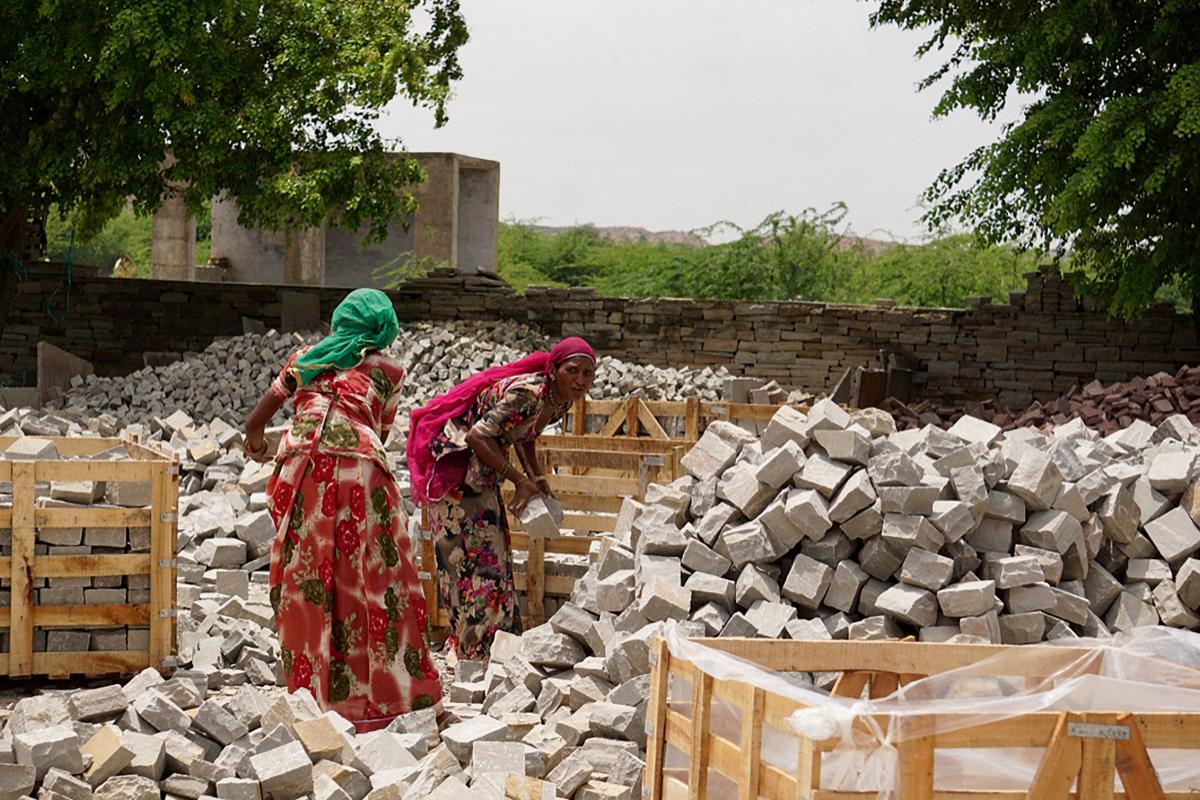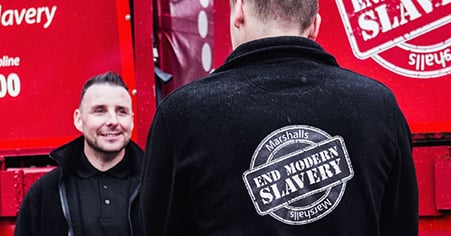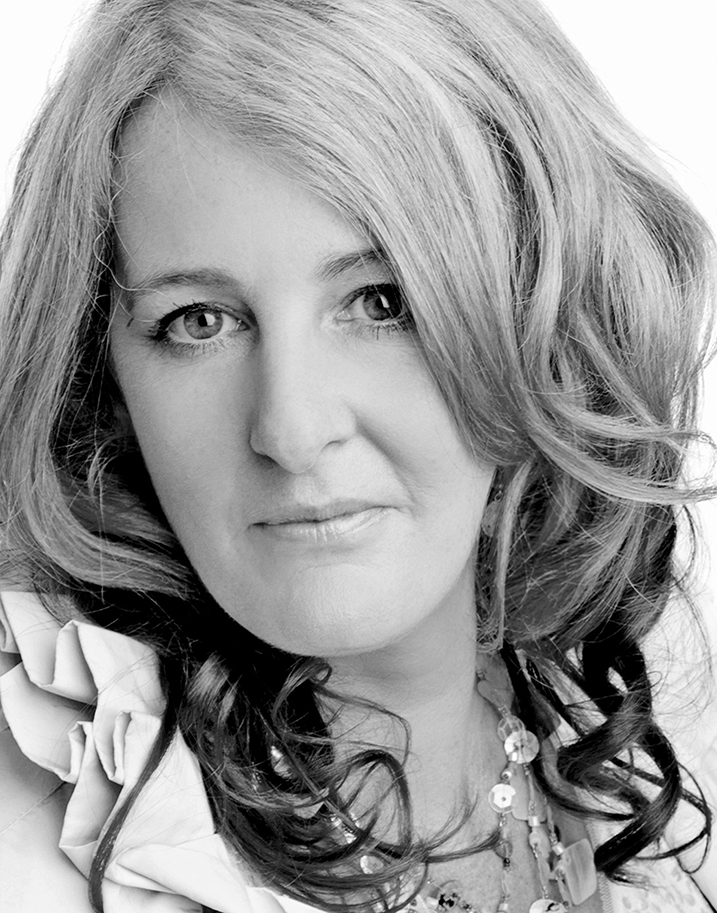
Elaine Mitchel-Hill (pictured above) describes herself as “a bit of a human rights geek”. She is the Business & Human Rights Director of Marshalls, a role that influences every aspect of the group’s activities.
Elaine Mitchel-Hill’s appointment as Business & Human Rights Director of leading hard landscaping group Marshalls coincided with the passing of the Modern Slavery Act in Parliament in 2015. The Act requires larger firms like Marshalls to complete a modern slavery report annually to show what action they are taking to eliminate exploitation in their field of activities. Marshalls, which quarries stone in the UK and imports it from the Far East, has been a leader in its response.
In the Home Office Modern Slavery Unit annual report published in October last year it was stated that more than 10,000 people had been identified as potential victims of modern slavery in the UK in 2019, many of them working in plain sight, some of them in construction. There are probably many more who have not been identified.
And the restrictions imposed by the Covid-19 pandemic are speculated to have made it easier to hide people trafficking and exploitation, as some of those who might otherwise have seen it have been locked down at home.
Marshalls says it wants to tackle slavery because it’s the right thing to do, but public companies that rely on shareholders (like Marshalls) are also finding it in their best interests to engage with the problem.
This year’s annual report from the UK’s Independent Anti-Slavery Commissioner, Dame Sara Thornton, says a 20-strong coalition of investors led by Rathbones formed a group called Votes Against Slavery last year and targeted 22 FTSE 350 companies that were not complying with their legal requirement to publish an annual slavery and human trafficking statement. Twenty of the companies complied as a direct result of that engagement.
By the time Dame Sara presented her annual report in July the Votes Against Slavery group had grown to 97 investors representing assets worth £7.2trillion. Dame Sara said: “I will be supporting Votes Against Slavery as it engages with more businesses this year.”
Another group of 51 investors representing £4trillion of assets has come together under charity fund manager CCLA’s Find it, Fix it, Prevent it initiative, which again involves direct engagement with companies, asking them what they have done to find modern slavery in their supply chains, address the issues and make life better for the victims. Last year the group targeted the hospitality industry, which was shut down for much of the time. This year its focus includes construction.
The stone industry worldwide does not have a squeaky clean record on slavery. Much of the stone used in the UK comes from Asia, mostly from India and China, where there have been reports over many years identifying child labour, bonded labour, prisoners forced to work in quarries and other human rights abuses. The granite and sandstone suppliers of Rajasthan, India, have been a particular focus, because that is where a lot of the stone used for hard landscaping in the UK comes from.
But modern slavery is not restricted to overseas. There have been convictions in this country of gang masters operating in construction. They sometimes enslave vulnerable UK residents but more often tempt people from overseas into borrowing money from them in order to come to the UK on the promise of a better life. When they arrive, their passports are taken from them and they are forced to work to repay the loan.
They have little or no money of their own, live in overcrowded conditions on a poor diet and are often intimidated physically.
All of these issues are addressed for Marshalls by Elaine Mitchel-Hill.
Before she was appointed as a Director of Marshalls she had been a consultant for the company on human rights issues for a decade. With the passing into law of the Modern Slavery Act it became clear to the Marshalls board that the issues needed full time attention.
“You can come at this by putting human beings at its centre or you can look at it as a compliance exercise. Marshalls has always engaged with the spirit of the Act rather than the letter of the law,” says Elaine, who champions Marshalls’ fight against slavery both in the UK and overseas.
In the UK she makes sure everyone working for Marshalls – around 2,800 people – know what the signs of modern slavery are and how slavery impacts the company and the wider community.
As those involved in modern slavery are criminals, and quite possibly part of a wider organised crime gang, confronting them face to face is not necessarily going to end well, so Elaine also instructs Marshalls’ employees about how to report any suspicions they have.
The End Modern Slavery message is carried on the livery of the 350 or so lorries in the Marshalls fleet and on the jackets of drivers, along with the Modern Slavery helpline phone number (0800 121 700), although concerns about modern slavery can also be filed online at www.modernslaveryhelpline.org.
Marshalls’ employees have reported their suspicions when they have come across potential cases. “We have all seen the media. We know it happens in the UK,” says Elaine.
“We have a holistic approach at Marshalls that puts the victim at the heart of our efforts,” says Elaine, and with that focus the company was one of the original partners of the Bright Future partnership, which offers work placements, possibly resulting in full-time jobs, for people rescued from exploitation. On average, Bright Future finds work for a survivor every month.
From a modest beginning in 2017 when it was conceived by an employee of the Co-op, Bright Future is now its own legal entity with more than 50 business and charity partners.
But Marshalls was taking an ethical approach to its international supply chain long before the government passed the Modern Slavery Act. It has been actively involved in the Ethical Trading Initiative (ETI) for many years, with Chris Harrop, Marshalls Group Marketing Director, being instrumental in the creation, with interests in India, in 2013 of the ETI Rajasthan Sandstone Working Group. It helped earn him an OBE in the 2019 New Year’s Honours List.
Involvement in the fight against exploitation starts at the top of Marshalls, with CEO Martyn Coffey’s latest involvement being in a high level online conference on child abuse by UNICEF and the International Labour Organisation (ILO) in June. He answered questions from Amar Lal, who has become a lawyer since being rescued from bonded labour in a sandstone quarry in Rajasthan by Kailash Satyarthi, the Nobel Peace Prize winner who is credited with having rescued about 90,000 children from slavery.
The conference discussed a new report by UNICEF and ILO that showed child labour increased in the four years to the end of 2019 after having fallen for the previous 20 years. It said there are 160million children in the world being forced to work, 8.4million (5.5%) more than in 2015.
And the suspicion is the number will have increased again as a result of the Covid pandemic because it has made the already vulnerable more vulnerable. If they have not been able to work and have no support from their governments, there are few options but to borrow. Bonded labour, although illegal in India, is sometimes the only way of repaying debts and often the whole family is bonded. Amar Lal was born into bonded labour.
Martyn Coffey said Marshalls ensures there is no child labour in its first and second tier supply chain. But it says it is not enough for companies to focus solely on their own activities, they have to work towards eradicating the problem at a sector level.
Elaine Mitchel-Hill says the coming together of Martyn Coffey and Amar Lal gave her a rare moment of peace. “I was in the virtual room, just listening, and I had a moment of stillness – that connection, with a former child labourer talking directly to a CEO of a public company. If they can work together it changes the dialogue.”
Elaine says people in the UK get sold the idea that families work together in quarries out of choice, because it’s part of their culture. But she says it is not like that. Children are often taken from their families and sold again to be trafficked around the world. They are physically and sexually abused, perhaps killed.
Marshalls works with what Elaine describes as other enlightened businesses to tackle modern slavery in all its forms, but she says businesses cannot end modern slavery on their own. It has to be achieved in partnership with governments and international organisations such as the United Nations.
The UK government, for example, can align its overseas aid to objectives designed to tackle slavery – Elaine recently provided evidence to a UK Government committee regarding the UK’s approach to tackling modern slavery through the aid programme, having participated in the Independent Commission for Aid Impact consultation in 2019.
India tends to draw most attention on issues of labour exploitation not only because a lot of stone comes to the UK from the sub-continent but also because the UK supplies foreign aid to India. The combination gives the UK a greater level of influence over what happens there than it has in China, for example, although slavery does exist in China.
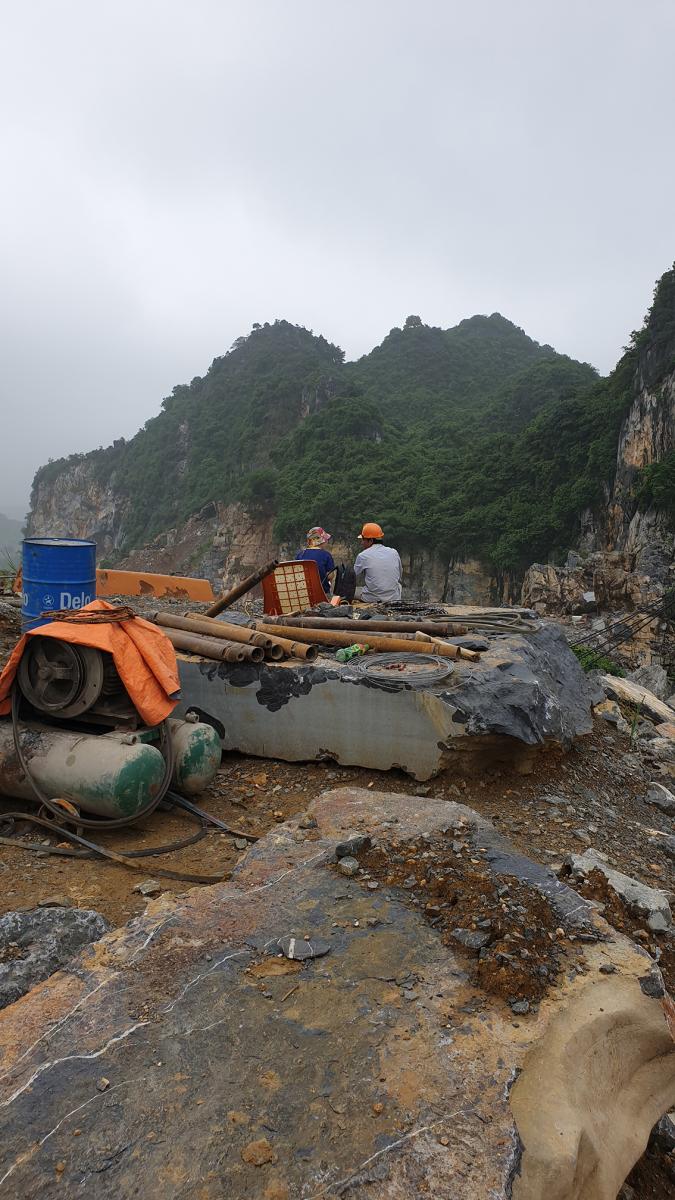 A photo taken by Elaine Mitchel-Hill in Vietnam, accompanying the UN International Organisation for Migration while they undertook research into Marshalls’ supply chain and the stone supply sector in general. They were commissioned by Marshalls so it could better understand modern slavery risks. The photograph shows an interview with a migrant worker, high up in one of the quarries Marshalls’ stones come from.
A photo taken by Elaine Mitchel-Hill in Vietnam, accompanying the UN International Organisation for Migration while they undertook research into Marshalls’ supply chain and the stone supply sector in general. They were commissioned by Marshalls so it could better understand modern slavery risks. The photograph shows an interview with a migrant worker, high up in one of the quarries Marshalls’ stones come from.
Some of Marshalls stone also comes from Vietnam, where there are cases of people in detention centres being forced to work in the stone industry. Some people in detention centres have not been convicted of any crimes.
Marshalls keeps a close eye on its suppliers to make sure they are not using prison labour, but with the government of Vietnam defending and even encouraging the use of forced prison labour it can be an uphill struggle.
Under normal circumstances (ie when there is not a pandemic) Elaine spends half her time abroad with the Marshalls supply chain and the communities involved with it. She talks to non-governmental organisations, British embassies and UN bodies. She says some people working in the stone industry in Asia often flit between stone and agriculture, depending on the seasons, so tackling cases of exploitation can cross sector boundaries.
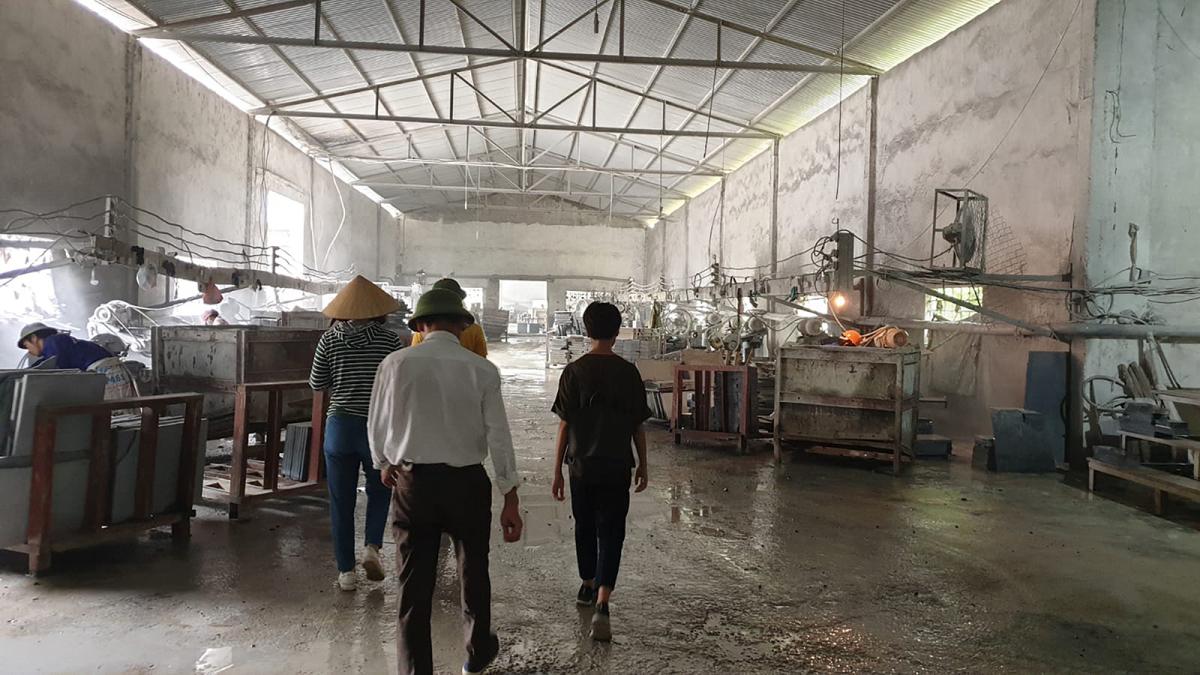 Photograph taken in a supplier’s factory by Elaine during her visit to Vietnam at the end of 2019, just before the pandemic curtailed her overseas visits.
Photograph taken in a supplier’s factory by Elaine during her visit to Vietnam at the end of 2019, just before the pandemic curtailed her overseas visits.
Marshalls also still works with the ETI. “It’s almost become part of the fabric,” says Elaine. “We look at our supply chain through the lens of the ETI base code.”
In 2019 Elaine accepted an invitation to become an (unpaid) trustee of the Traffik Analysis Hub (TA Hub), which has been funded to the tune of £3million by IBM to collect big data on slavery and people trafficking globally. Its activities include tracking the routes people take when they are being trafficked, with many starting in rural areas of their home countries.
Elaine admits that some of what she encounters in her role in combating modern slavery is distressing, but says: “I convert this into the energy I need to drive forward rather than allow it to create a drag effect.”
Tackling slavery is justification enough for Elaine’s work, but she says she also enjoys the fact that it is helping to raise living standards in general. She says when she first visited India there were no motor vehicles parked around the quarries and workshops. Now “their carparks are massive and rammed with motorbikes”.
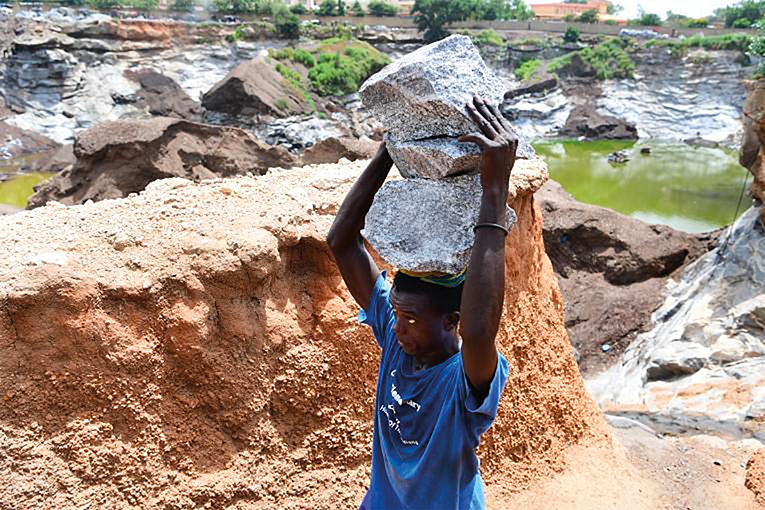
There are 160million children in forced labour around the world, say the ILO and UNICEF. Marshalls CEO Martyn Coffey says companies have to help end it. Photo: ILO/UNICEF
No Child Left Behind
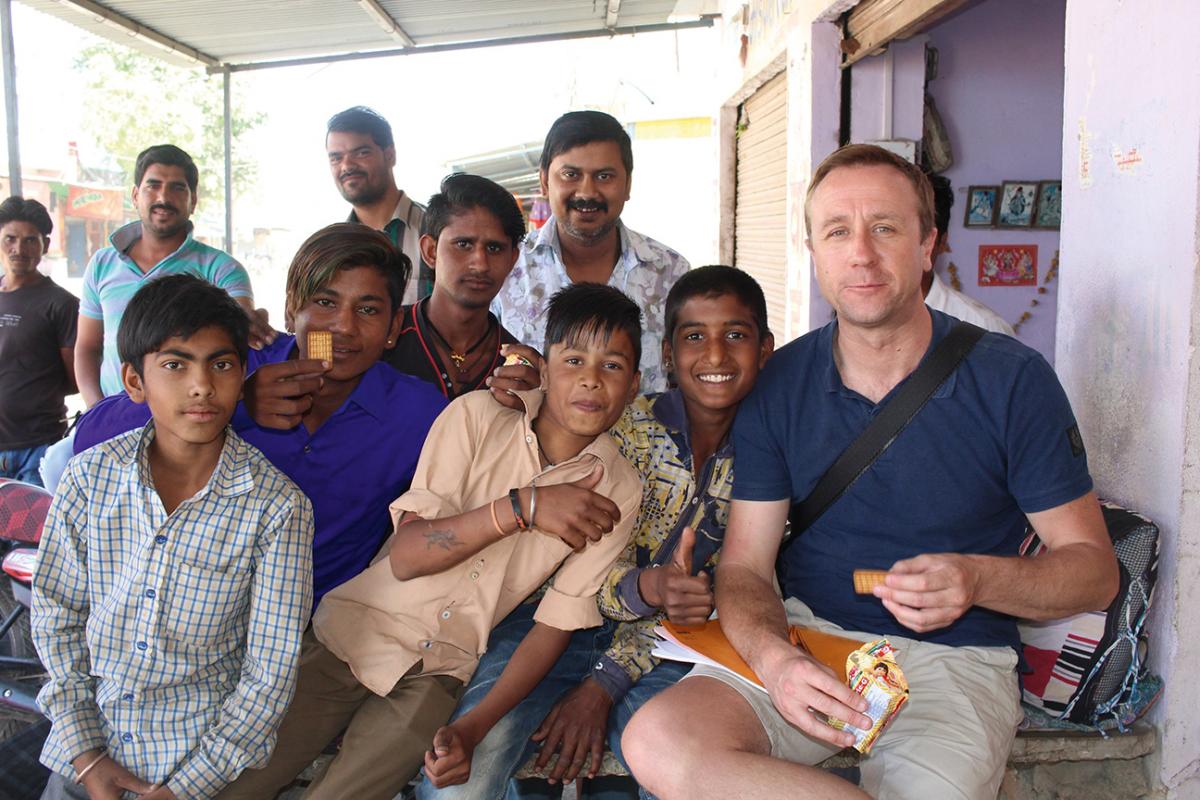
The No Child Left Behind campaign is aiming to get children out of quarries and into school. Landscaping product company London Stone has thrown its weight behind the campaign and Director Steve Wally wants more UK stone supply companies to get involved. Steve Walley is pictured here with children in Budhpura.
If you think the Covid pandemic has hit the UK hard, spare a thought for parts of the world where there is less support – Budhpura, for example, which is a region of Rajasthan in India that supplies the UK with many of its cobblestones.
There are many women working in the quarries there and they often have no alternative to taking their children with them. Once there, the children also work. Cobble production is a sector that is notoriously vulnerable to the use of child labour. The challenge is to persuade all community stakeholders that children should be in school, not working in a quarry.
That’s the aim of the No Child Left Behind campaign, which aims to create Child Labour Free Zones (CLFZs) by establishing schools and encouraging parents to send their children to them.
Sometimes they give simple, practical assistance, such as providing sanitary products for girls so they do not stay away from school some days every month.
The project has had successes, with more than 1,000 children leaving work and enrolling into formal education. The whole community has been mobilised to take control of its own future.
But since last March when the coronavirus pandemic struck, the schools have been closed.
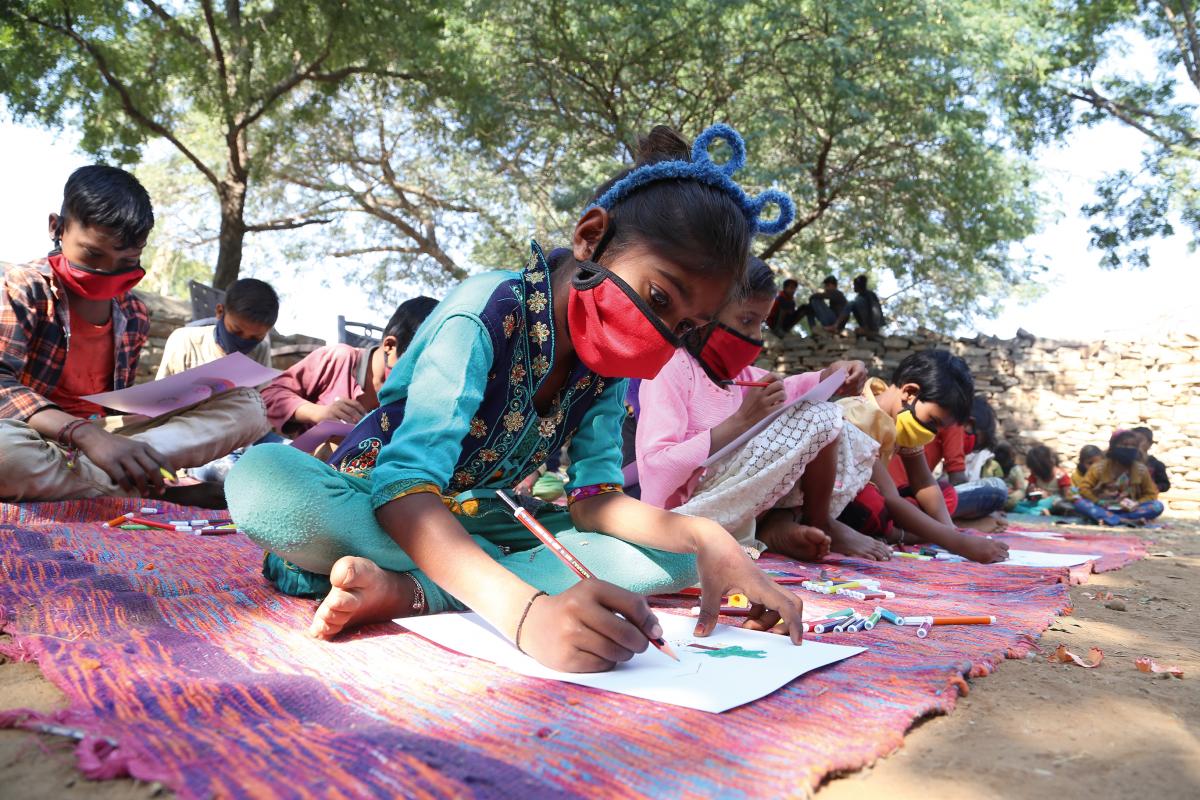 Classes have been held when possible during the Covid Pandemic. Photo: Manjari
Classes have been held when possible during the Covid Pandemic. Photo: Manjari
The response in Budhpura by Manjari, one of the non-governmental organisations (NGOs) involved in India with No Child Left Behind has been to take the schools to the children, delivering educational material and face masks (see the photograph).
No Child Left Behind also started a mobile library service. It began with just 60 books, but has grown and has lent 3,000 books to 1,000 children in the past year.
No Child Left Behind was started in 2013 and Steve Wally heard about it and got involved in 2015. Beltrami and its sister company Stoneasy, both now part of Brachot, are also involved.
Steve had seen the conditions of the people working in Budhpura, including child labour, on his visits to his suppliers. “They’re not just people in a far off foreign country,” he says, “they’re part of our supply chain. We want to treat them the same way as we treat our own workers as much as we can.”
Steve was originally involved with the ETI [Ethical Trading Initiative] but found it “all a bit corporate” with its big office in London.
He says: “This project, No Child Left Behind, is much smaller in scope. It actually makes a difference.”
He has written blog posts about the project, which you can read at www.londonstone.co.uk/blog/tag/no-child-left-behind/. He says: “I think it influences specifiers. They are very open to this. We have tried to get our customers to be advocates.”
But Steve would like more of the stone industry in the UK to get involved with No Child Left Behind. You can find out more about it at www.nochildleftbehind.co.uk as well as on Steve’s blog. And if you want to help, contact Steve at London Stone on 01753 212950 / steven@londonstone.co.uk.
Below. Women stacking cobbles into crates for transport in Budhpura, a region of Rajasthan in India. Photo: Eline Wijnen
